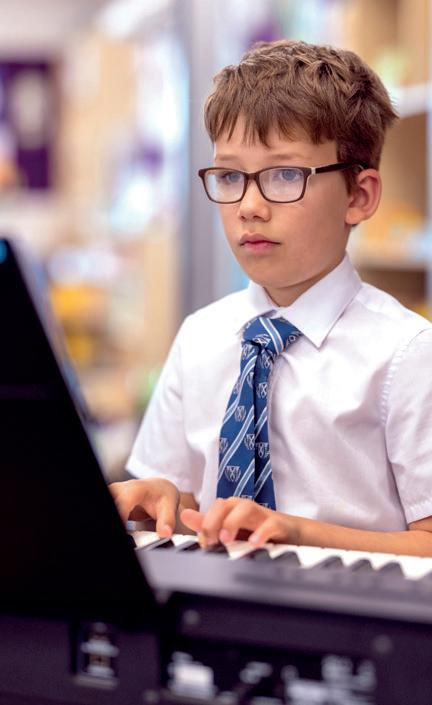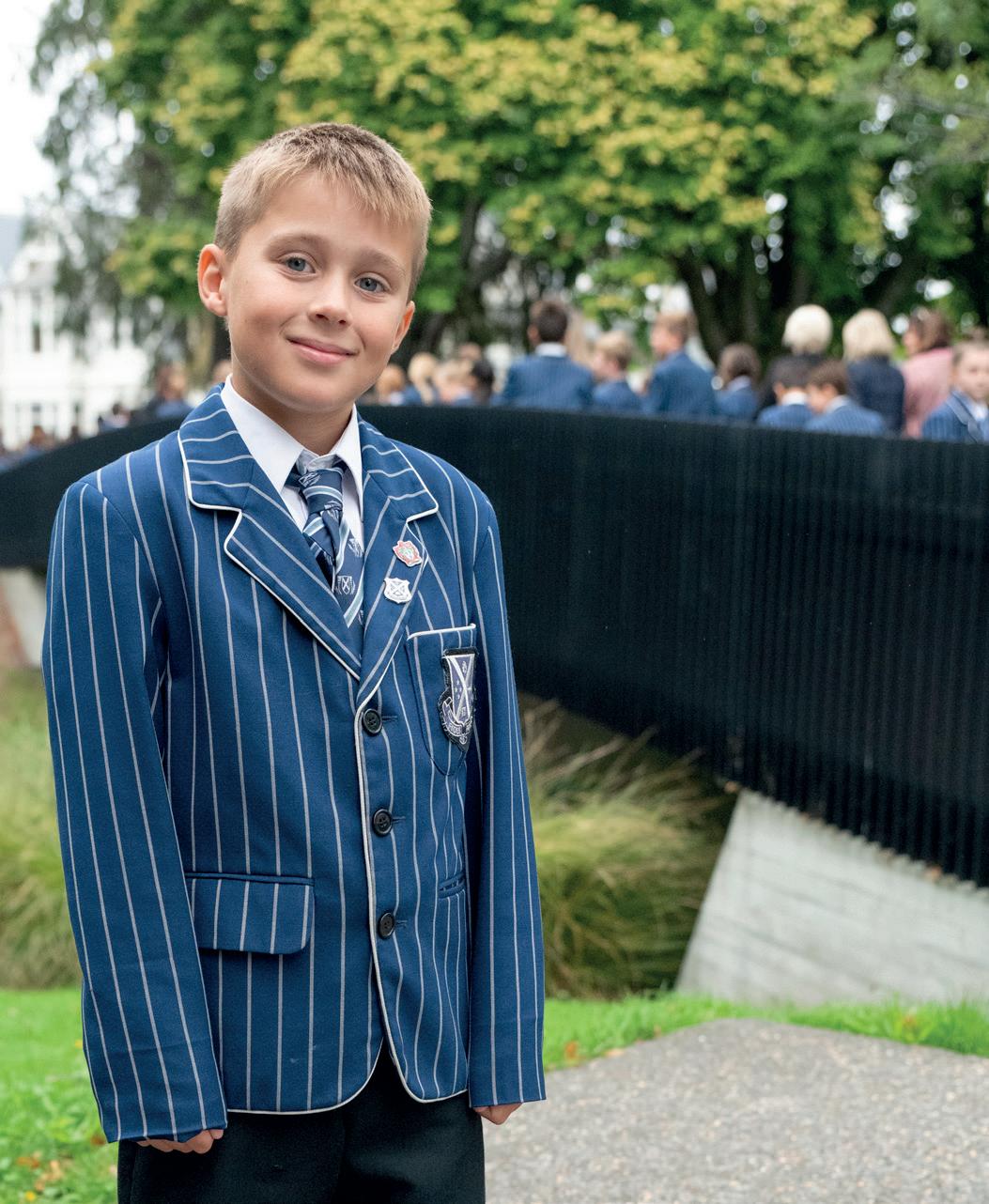
5 minute read
Gifted and Talented
The purpose of defining and identifying giftedness is to recognise individual and group abilities, qualities, and interests. Gifted education is about ensuring gifted potential is realised, gifted learners discover their strengths and follow their passions, and barriers to success are minimised. Students in the Preparatory School who have been identified as Gifted and Talented are monitored and placed on the Learner Needs Register on the school’s student management system, Synergetic. Definition and Identification In the Preparatory School staff provide responsive learning environments in which students are encouraged to become adaptive, creative, and resilient.
Curriculum differentiation is a strategy used by staff to cater for the wide range of abilities in classrooms. Differentiation greatly enhances the educational experiences of gifted and talented students. When gifted learners are active participants in their learning and experience appropriately differentiated teaching and learning, well-being is promoted, and achievement and progress is accelerated.
The underlying principles guiding differentiation for gifted and talented students are to: • present content that is related to broad based issues, themes, or problems; • integrate multiple disciplines; • present comprehensive, related, and mutually reinforcing experiences; • develop independent or self-directed study skills; • develop productive, complex, abstract and/or higher order thinking skills; • focus on open ended tasks; • develop research skills and methods; • evaluate student outcomes by using appropriate and specific criteria through self-appraisal.
Curriculum enrichment is also used widely across all year levels of the Preparatory School. Curriculum enrichment refers to ‘learning activities providing depth and breadth to regular teaching according to the child’s abilities
and needs’ (Townsend, 1996). Curriculum enrichment is taught by specialist teachers and includes Physical Education, Religious Education, Spanish (Years 1–7), French (Year 8), Music, Dance and Drama, Art, Food, and Materials Technology (Years 7–8).
The provision of appropriate opportunities for all students is at the heart of learning in the Preparatory School.
In 2021, COVID-19 impacted directly on several enrichment activities in the Preparatory School. Many competitions were postponed or changed to virtual or online events. However, even despite this, many opportunities for enrichment still went ahead and excellent results were achieved.
In 2021 the following areas were provided:
Writing Enrichment Kerrin Davidson worked in the Preparatory School as part of a Writing Enrichment programme. Kerrin is a published author and was Victoria University’s Creative Writing Teacher of the Year 2008. 2021 saw the Writers’ Enrichment programme in the Preparatory School continue to grow from strength to strength with an increase in classes and two writers’ master classes running from Years 3–7. The purpose of these classes was not only for the students who require extension in literacy, but also for those students who have a passion for writing. Kerrin’s classes provided an open-ended platform for students to write creatively with no barriers. She encouraged all students and guided them positively in their learning. Sessions were run on a Monday and Thursday afternoon, as well as Wednesday lunchtime, with a variety of competitions entered including New Zealand Poetry Box, Seaweek Competition, Royal Commonwealth Queen’s Essay Competition, New Zealand Poetry Society International Competition, Vancouver International Competition, Gifted Association Competition, and the Otago Daily Times competition. The year concluded with a Creative Writing Competition held in the Preparatory School for Years 3–5 (Anel Bartlett) and Years 6–8 (Emma Geddes). Winners received a cup at the end-of-year assembly.
Future Problem Solving (FPS) Future Problem Solving: To dream and to plan, to be curious about the future, and to wonder how much it can be influenced by our efforts are important aspects of being human. – Dr E Paul Torrance, founder of FPSNZ
Future Problem Solving is a highly regarded and well-researched international educational programme that develops creative, critical, and caring thinking skills in students. Students grapple with global and community issues, identify underlying problems, and create positive solutions to those issues. Above all, it aims to give young people the skills to design and promote positive futures as citizens of the 21st century.
In 2021, the FPS programme was successfully coached by Julie Rogers, who has over 15 years’ experience. There were 10 teams across Years 5–8 with more than
60 students involved in the Preparatory School programme. In 2021, a squad of seven students qualified for and competed in the International FPS Virtual Final. In previous years this has been held in the USA. The students all worked very hard in the lead up. There was a lot of work done using Zoom and the Teams video call function.
The students were among more than 1500 problem-solvers from over 10 countries at the competition, in which critical thinking and problem-solving skills are applied to hypothetical future situations.
In the Presentation of Action Plan Drama, our Junior Division team of Daniel Liu, Tom Simpson, Katie Foot, Kate Ramsey, Sara Yu and Hannah Withers came fourth internationally.
In the Global Issues Problem Solving Written Booklet our Junior Team of Daniel Liu, Tom Simpson, Katie Foot and Kate Ramsey achieved fifth place internationally.
Also, Hannah Withers, our Year 8 Individual competitor came seventh place in the Written Booklet.
At the national final, we had three teams qualify and one individual. The students again achieved amazing success.
Both our Year 6 and Year 8 teams placed first in the Global Issues Team Booklet. Our Year 7 team was placed third. Our individual competitor, Hannah Withers, placed first. In 2022 we have qualified again to compete in the international final.
Year 6 Team: Alyssa Geddes, Sophie Schouten, Nika Meyn, Alexa Collis Year 7 Team: Honour Fraher-Richardson, George Flannagan, Fraser Walls, Anton Zhang Year 8 Team: Matthew Bluck, Ania Kuziel, Charlotte Kyle, Teresa Steiner
In the Middle Syndicate a Year 5–6 group attended FPS sessions twice a week in the Stepping Stones – Non-Competitive division. This division was particularly suitable for students and coaches who were attempting Future Problem Solving for the first time. This year a team from this division competed in the national final and came first, which is an outstanding achievement.
Students spent time each week learning about the FPS process and researching various topics. Our teams worked very effectively together, developed critical thinking skills, and built a strong foundation for the 2021 programme. The students ran a feedback session and highlighted the following about their FPS time: learnt to work more efficiently with greater time management, developed more effective research skills and strategies to solve world issues, enjoyed futuristic thinking opportunities, and developed effective team building skills.
Other enrichment opportunities offered in 2021: • Rotary Speech Competition; • Kids Lit Quiz; • Extension Mathematics class Years 7–8; • Otago Problem Solving Years 7–8; • Code Club; • 3D Design and Printing Club; • Chess Club Terms; • D-Squared Drama Group; • VEX IQ Robotics Club (Year 7); • ICAS Examinations; • Speech and Drama.









